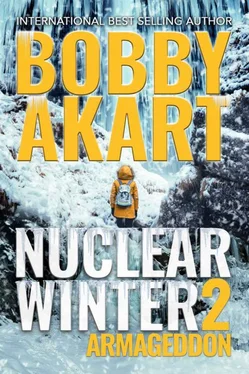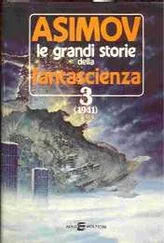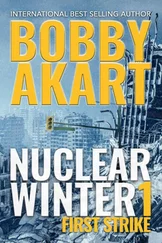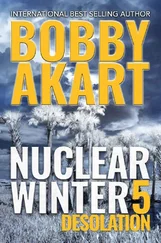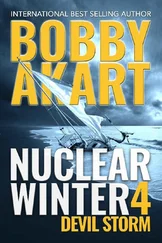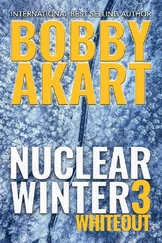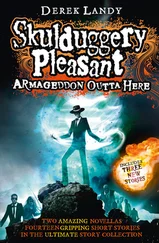“Whaaaaa!” Patrick joined in the screaming. “Whaaa! Help him!” Then he let out an evil, guttural cackle.
The man lifted his head to look at his naked body. His eyes grew wide as he viewed the interior of the bank vault.
“Please, mister. Please don’t hurt me. I mean. I won’t tell anyone. I swear!” He shouted the last words at the top of his lungs to the point they were barely discernible.
Patrick shouted back, “Scream all you want! Nobody can hear you!”
He closed the switchblade and set it on the tray. He took another long gulp of wine before grabbing the bottle to refill the glass.
The man didn’t say a word as his eyes followed Patrick’s every movement. He walked around the table, studying every inch of his victim. Then he stopped and reached underneath the table. He pulled out a DeWalt cordless Sawzall. He held it upright and goosed the trigger, causing the reciprocating saw blade to rapidly move in and out of the tool.
“Noooo! Puhleeze!” The man screamed for mercy.
Patrick responded calmly, “Let’s get started, shall we? You’re not gonna need this anymore.”
The sound of the reciprocating saw cutting through flesh was drowned out by the shrieks of agony. Patrick and Patricia had stepped up their game.
PART V
Day twelve, Tuesday, October 29

Tuesday, October 29
Mount Weather Operations Center
Northern Virginia
“Erin, thank you for making the trip to Mount Weather. I understand your bird’s-eye view of the devastation was gut-wrenching.” Chief of Staff Chandler was cordial to Secretary of Agriculture Erin Bergman as she entered the briefing that morning. In fact, the stress level of all the attendees was considerably less than the prior sessions.
The White House physician had ordered a sedative and bed rest for the president. President Helton was on the verge of a nervous breakdown. The decision was made both for his physical and mental well-being but also for the morale of those who’d witnessed his tirades. The president was losing the confidence of his cabinet and military leaders. There were already whispers to the effect he should step down in favor of the vice president taking the helm. Before that happened, his doctor insisted he take some time off to clear his head.
Besides, Chandler ran most of his briefings anyway. Rarely did the president make a decision without discussing it at length with his longtime friend and confidant. The president wanted to turn his attention to the recovery effort, and Chandler assured him more meetings would be held with that in mind.
Within the president’s cabinet, Erin was considered the most knowledgeable on the concept of nuclear winter and how it would impact the nation’s agriculture and food supply. Although she was well-versed on the topic of electromagnetic pulse energy and its effect on transportation, she deferred that issue to her counterpart at the Department of Transportation.
“It’s sickening, Harrison,” replied Erin, who was on a first-name basis with the president’s chief of staff. The president understood the need for formality, but within his immediate circle of advisors, such as the chief of staff and the cabinet, he instructed them to address one another on a first-name basis. In President Helton’s mind, disagreements would be less acrimonious when the combatants referred to each other by name rather than mister this or miz that. “I’d seen the satellite imagery, but flying the chopper past our nation’s capital brought tears to my eyes.”
“I understand it’s difficult to see in more ways than one,” said Chandler.
“Very much so. The thick smoke from the out-of-control fires makes visibility difficult. At times, the extraordinary ground-level winds created an opening in the smoke that allowed me to see the immense crater. It’s hard to believe we all worked in that spot just a few days ago.”
Chandler sighed and nodded. “Erin, we’re trying to find a way forward that both saves the lives of those in the paths of radiation or these superfires and Americans who live away from the blast zones. NOAA has provided me some sobering graphics of the fallout spanning the globe, especially in the Northern Hemisphere.”
“I’ve seen them as well. I’ve had an opportunity to speak directly with some of the research scientists at NOAA. They’re all astonished at how widespread the effects of nuclear winter have been.”
“And so quickly,” added Chandler. “I had a working knowledge of the concept as it pertained to a regional nuclear war between India and Pakistan. I’d never seen a hypothetical that involved as many nukes as they fired off and a fallout spread that circumnavigated the planet with such speed.”
“That’s the key. The speed at which the massive cloud of soot and smoky ash reached the atmosphere and then began to spread is remarkable. It’s been ten days since the exchange in the Middle East and eight days since South Asia. Yet the entirety of North America is now feeling the effect.”
Chandler brought her up to speed on the administration’s directives. “We’ve ordered all personnel to remain within the confines of Mount Weather and underground due to the poor air quality. Now I’m told by the National Weather Service that average temperatures have dropped eight degrees already.”
“That’s right, Harrison. As we know, temps can fluctuate, but what we’re witnessing is a steady decline. Keep in mind, there are regions, like the Mountain West, that will experience plunging drops in the next few days. The west coast superfires are generating so much heat that the prevailing winds are being held off the coast and even pushed backwards toward the center of the Pacific. This is allowing frigid air to swoop down through the Rockies. Eventually, these icy conditions will make their way across America’s heartland.”
“What does that mean for our agricultural and livestock supply?” asked one of the attendees in the room.
“There is some good news in that regard,” Erin began in her reply. “By this point in the season, the vast majority of crops in the Midwest had been harvested. Obviously, there were late-season crops like most of the root vegetables. The problem lies with what happens next. Any notion of planting this spring should be abandoned.”
“What do you mean?” asked Chandler.
“Unless there’s some kind of miracle from God or Mother Earth, the grounds across the upper latitudes of North America will remain frozen until late spring or even summer. If you couple that with the toxicity levels resulting from the nuclear fallout, including ash and debris, you’re looking at soil that isn’t fit to grow anything.”
“How long will this last?” asked the labor secretary, who insisted on sitting in even though it was beyond his purview. Every member of the cabinet wanted to play a role in the recovery effort.
“Years, based upon current projections,” replied Erin. “All of this effects livestock and poultry as well. These animals rely upon our fields and nutrients from the ground to survive. It’s doubtful there’s a rancher in America who has stored sufficient grasses to feed their cattle. Every food-producing animal relies upon what is produced in the nation’s breadbasket to survive. There will be a war trying to decide whether to feed animals or people.”
“There already is,” said Chandler as he shook his head. “The president is being called upon to nationalize all farming operations. They want us to seize every ear of corn and potato available.”
Читать дальше
